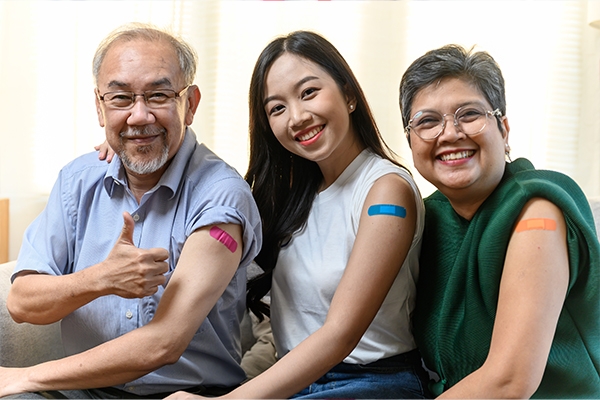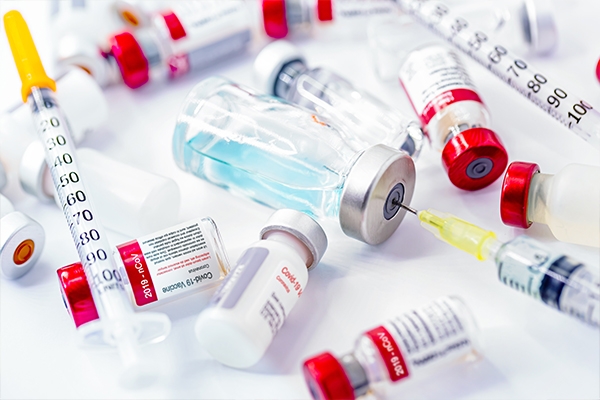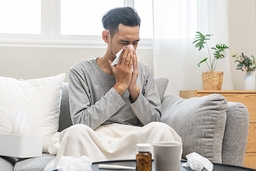Why You Should Get Vaccinated

In the past 50 years, vaccines have saved at least 154 million lives worldwide—that’s six lives per minute. This incredible feat shows how vital vaccines are to human health, even today.
Vaccines work by teaching the immune system to recognize and fight disease. Once the body knows how to make antibodies against a virus or bacteria, it can provide long-lasting, even lifelong, protection.
Vaccination not only prevents illness or reduces disease severity, but it also protects others around us.
By creating herd immunity, vaccines help control the spread of serious diseases in the community, protecting those who are unable to get vaccinated for medical reasons.
Vaccines are so more than just personal protection; they are also a social responsibility. Let's find out why babies and adults need vaccinations!

1. Protecting against serious diseases
Vaccines help the immune system fight infections before they develop. This is crucial because many infections can be severe, cause long-term complications, or even be fatal. For example:
- Measles can lead to brain inflammation and death.
- Chickenpox can cause to pneumonia and severe skin infections.
- Polio can result in permanent paralysis.
- Mumps can infect the testicles and ultimately lead to infertility in men.
- Haemophilus influenzae infection can cause permanent deafness and brain damage.
- HPV causes several types of cancer, including cervical cancer.
- Tetanus produces a deadly toxin that attacks the nervous system.
Vaccines help the body recognize the germs and build up a long-term defense without having to get the disease itself.
2. Vaccine-preventable diseases have not gone away
Viruses and bacteria that cause disease and death are still around and can be passed on to those who have not been vaccinated or are unprotected. While many preventable diseases are becoming rarer, global travel makes it easier for them to spread.
3. Vaccines have saved millions of lives
In the past 50 years, vaccination has saved more than 154 million lives—that’s 6 lives per minute over five decades. Vaccination accounts for 40% of the increase in infant life expectancy, with the measles vaccination accounting for 60% of that.
By continuing to expand vaccination coverage, we can save more lives, from newborns and children to adults and seniors.
4. Protecting the people around you (herd immunity)
A vaccine protects not just you but also those who can’t be vaccinated:
- Babies who are too young to get immunized.
- Elderly people with weakened immune systems.
- People with cancer, organ transplants, or autoimmune diseases.
When enough people get vaccinated, the disease's spread ends. This is known as herd immunity.
5. Prevention is better than a cure
Many vaccine-preventable diseases have no effective treatments, or if they do exist, they require hospitalization and high costs. Vaccination is the safest and most cost-effective way to prevent infection before the germs make you sick.
6. Vaccines are safe and have been tested
Vaccines go through rigorous testing and ongoing monitoring to ensure they are safe and effective. Mild side effects such as fever or soreness at the injection site are signs that your body is developing immunity.
7. Vaccines for all ages — not just kids
Immunizations aren’t just for kids. Adults need vaccines, too, such as
- Annual influenza vaccine for all ages.
- HPV vaccine for teens and young adults.
- Tetanus-Diphtheria-Pertussis vaccine for adults and pregnant women.
- Pneumonia and Shingles vaccines for the elderly.
- Hepatitis and Meningitis vaccines for travelers or certain workers.
- Dengue vaccine for those who have had dengue fever and are at risk of getting it again.
How vaccines work: triggering immunity without causing disease

A vaccine safely mimics an infection so that the immune system learns to recognize and fight it. There are various types of vaccines:
- Live attenuated vaccines: Effective for long-term immunity, but not recommended for people with weakened immune systems. These contain viruses or bacteria that have been weakened so that they no longer cause disease but still activate the immune system to respond.
- Killed or inactivated vaccines: Suitable for all ages and medical conditions. The pathogens in these vaccines have been killed or inactivated, rendering them incapable of causing disease.
- Subunit or conjugate vaccines contain small pieces of a pathogen (such as a protein or carbohydrate) that can trigger an immune response.
- Recombinant vaccines contain proteins created using genetic engineering.
Following vaccination, your body develops antibodies and immune memory. If you’re exposed to the germ in the future, your body is ready to fight it off.
Vaccine side effects
Most people don’t have serious side effects from vaccines. The most common side effects, such as pain at the injection site, are usually mild and go away on their own.
The most common side effects after vaccination are mild. These side effects include:
- pain, swelling, or redness at the injection site;
- mild fever;
- chills;
- feeling tired;
- headache;
- muscle and joint pain.
These side effects are signs that the body is starting to build immunity (protection) against a disease.
However, out of 1 million doses of vaccine, only 1-2 people may experience severe allergic reactions, such as difficulty breathing, swelling of the face and throat, rapid heartbeat, severe rash all over the body, and dizziness and weakness.
What’s next?
Double-check your and your family’s vaccination records. Consult your doctor about recommended vaccines based on your age, lifestyle, and health conditions.
Because prevention is always better than a cure, vaccines save lives — both yours and that of your loved ones



